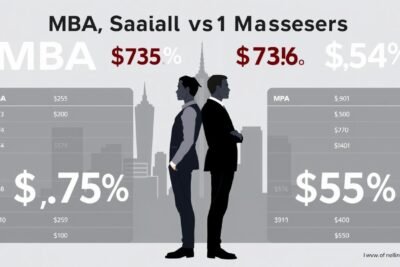
UK Finance Graduate Salary Outlook for 2026

Think of Sam, who finished a business degree and took a job interview in May. He left the meeting confused by two figures: one headline above £35,000 and another nearer £29,000.
This article is your single, friendly point of truth to understand what you can realistically earn in the market in 2026.
You’ll see why ISE reports an average salary of £35,170 while HESA tracks £28,731 for first-degree leavers. The Department for Education puts median graduate pay near £40,000, compared with £29,500 for non-graduates, and IFS estimates lifetime gains of roughly £130k for men and £100k for women.
Explore high-demand careers, salary insights, required skills, and full step-by-step pathways to grow your professional future.
Explore Careers Guide →Read on to learn clear definitions, up-to-date salary data and practical ways to turn those numbers into a target range for your next career move.
- How to use this ultimate guide to plan your finance career in the UK
- Average graduate and finance starting salaries right now
- Where you work matters: regional salary differences for graduates
- Affordability check: salary versus cost of living across the UK
- Which finance industries pay best for graduates?
- Role-by-role finance salaries: from entry-level to experienced
- finance graduate salary guide UK: benchmarks, data sources and what to trust
- London lens: finance salaries and career acceleration in the capital
- 2026 outlook: salary projections and the forces that will shape them
- Beyond base pay: hours, bonuses and benefits that change your take-home
- Set your salary expectations and negotiate with confidence
- Your next steps to maximise your earning potential in UK finance
How to use this ultimate guide to plan your finance career in the UK
Use this piece to convert raw pay figures into realistic targets for your job search. Start by skimming each section overview and then open the parts that match your situation. This saves time and keeps your focus on the right comparisons.
Turn numbers into actions: pick the right comparator graduate schemes or broad graduate outcomes and set sensible salary expectations for the role family you want.
Map your current years of experience and role responsibility. Note whether you'll be full-time, part-time or in a part job, since hours and contract type change take-home pay.
Benchmark offers like-for-like: base versus total compensation, and adjust for location when you talk with employers. Capture three to five target employers and keep a simple spreadsheet of starting, mid-point and high-range figures.

| Action | Purpose | Key data | When to use |
|---|---|---|---|
| Skim sections | Find relevant chapters fast | Section overviews | Before deep dive |
| Choose comparator | Set realistic targets | Scheme vs outcomes | When pricing offers |
| Benchmark offers | Compare like-for-like | Base, bonus, location | At interview/offer |
| Track employers | Avoid decision fatigue | Starting, mid, high | Throughout search |
Average graduate and finance starting salaries right now
Different surveys report very different headline figures and that split matters when you set pay targets.
Two main sources are often quoted. The Institute of Student Employers (ISE) reports an average salary of £35,170. That figure mainly captures large employers and structured graduate schemes in sectors such as financial services.
The HESA Graduate Outcomes 2021/22 shows an average of £28,731 for first-degree leavers in full-time UK employment 15 months after graduation. This number reflects the whole market, including small firms and regional employers.

Why the numbers diverge and how you should use them
- ISE skews higher because its sample focuses on big-company intakes and fast progression.
- HESA gives a broad baseline for early years across industries and contract types.
- Use the ISE figure when targeting big schemes; use HESA for whole-of-market comparisons.
- Factor in the median and total compensation analysts often get bonuses and allowances that lift earnings beyond base pay.
Finally, note DfE and IFS findings: median working-age graduates earn about £40,000 versus £29,500 for non-graduates, and lifetime uplifts are sizeable. Match your ask to the dataset your target employer uses, so negotiations are grounded and credible.
Where you work matters: regional salary differences for graduates
Where you work has a direct effect on what you can expect to earn early in your career. Use regional figures to judge offers, not just headlines.
London shows the highest average salary at £32,657, around £6,296 more than Wales fifteen months after leaving university.
That gap often reflects the concentration of high-paying roles and professional services in the capital and the South East. Higher pay can be offset by higher rents, travel and daily costs, so check disposable income not just base pay.

Devolved nations and English regions compared
| Region | Average (15 months) | Notes |
|---|---|---|
| London | £32,657 | Highest headline figure |
| Scotland | £28,750 | Stronger than Wales/NI |
| Wales | £26,361 | Lower local market pay |
| Northern Ireland | £26,412 | Similar to Wales |
Reading 15-month data: what it tells you (and what it doesn’t)
These figures are early-career indicators. They capture first roles and immediate moves, not long-term progression or the median outcome across a full career.
Ask recruiters which location band an offer uses and blend this regional data with affordability checks in the next section.
Affordability check: salary versus cost of living across the UK
A higher headline number can still leave you short of cash if local house prices far outpace earnings.
House price-to-earnings ratios
Use ONS median ratios to see how far your pay will go in different places.
| Region | Median ratio |
|---|---|
| London | 12.66 |
| North East | 4.93 |
| North West | 6.05 |
| South East | 10.15 |
| Wales | 5.99 |
Purchasing power in practice
London’s 12.66 ratio means a larger headline salary can buy less than you expect.
A graduate earning an average salary in London may need to work about 2.6 times longer to reach the same housing milestone as a peer in the North East.
- Factor rent, transport and council tax into monthly budgets, not just house prices.
- Ask employers about location allowances or relocation support when ratios are high.
- Pressure-test offers by mapping net pay against typical costs and your savings goal.
Bottom line: a slightly lower wage in a cheaper location can leave you with more disposable income. Use these ratios to make offers comparable and to plan realistic next steps.
Which finance industries pay best for graduates?
Your employer’s industry often matters as much as the job title for early-career pay.
Industry-level data shows clear leaders. ISE reports legal at £43,508 and finance & professional services at £36,492. Digital & IT sits near £34,475 while energy and engineering average £31,695.
How occupations change the picture
Graduate Outcomes look at roles rather than sectors. For example, Finance Associate Professionals average £35,669 and Information Technology Professionals £36,076. Legal Professionals appear lower at £25,714 under this occupational lens.
What to take from the numbers
- ISE’s leaderboard favours large-scheme employers and shows legal and professional services near the top.
- Occupational data highlights that roles like accountant, analyst and regulatory functions often cross sectors and drive pay more than the sector label.
- Think about employer scale, structured routes (chartered or training contracts) and market demand for data-savvy analysts when choosing where to apply.
| ISE industry | ISE average | Comparable occupational example |
|---|---|---|
| Legal | £43,508 | Legal Professionals £25,714 |
| Finance & Professional Services | £36,492 | Finance Professionals £34,722 |
| Digital & IT | £34,475 | IT Professionals £36,076 |
Role-by-role finance salaries: from entry-level to experienced
If you line up typical roles side by side, pay ranges clarify which routes scale fastest.
Analyst, regulatory and compliance routes
Financial analyst entry pay sits around £23k–£30k. Mid-level analysts typically move to £30k–£50k as they add modelling, valuation and stakeholder work.
Regulatory finance often starts near £26k for new joins and can rise to ~£48k. Senior analysts and managers with reporting depth reach ~£70k.
Compliance roles begin roughly at £30k. After 3–5 years you can expect £55k–£70k. With 5+ years, pay commonly moves into the £60k–£90k band as you reach manager level.
Accounting, audit and tax
Compare tracks: a management accountant who is part‑qualified earns about £30k–£42k; once fully qualified, moves up toward £60k (higher in London). A financial accountant typically sits between £35k–£52k.
External audit trainees start at ~£28k, progress to £32k–£45k, and managers often earn £50k–£80k. Internal audit starts lower but builds to manager/director bands above £70k.
Tax advisers show wide range: graduates at £20k–£32k, rising to £25k–£55k. Securing CTA materially boosts your ceiling.
Pensions, insurance, banking, actuary and niche roles
Pensions administrators typically earn £23k–£38k; senior consultants hit ~£75k and directors can reach ~£120k. Insurance broking spans trainee £20k to senior £100k+ depending on commissions.
Investment banking base pay ranges from ~£42k up to £150k, with bonuses that can double or treble total pay. Actuaries start near £25k–£35k, grow to £32k–£70k and partners can exceed £200k.
Adjacents: financial advisers vary £23k–£100k+ and financial news writers sit around £24k–£37k with editors near £43k. Choose the role that matches the work you enjoy and the company support for qualifications you need.
| Role group | Entry | Mid / Senior |
|---|---|---|
| Analyst | £23k–£30k | £30k–£50k+ |
| Management accountant | £30k–£42k | Up to £60k |
| Compliance / Reg | ~£26k–£30k | £55k–£90k |
| Investment bank | £42k–£150k | Bonuses vary |
finance graduate salary guide UK: benchmarks, data sources and what to trust
Trustworthy benchmarks come from transparent reports, not single headline figures.
Key public datasets you should check are ISE (average £35,170; large-employer skew) and HESA Graduate Outcomes (average £28,731 at 15 months). The Department for Education shows a graduate median of £40,000 versus £29,500 for non-graduates. The IFS estimates lifetime net uplifts at roughly £130k for men and £100k for women.
Use these figures to triangulate, not to pick a single number. Pay attention to methodology and the reporting window: 15 months post-graduation captures early roles, not settled mid-career positions.
- Prioritise sources that state who they survey and when.
- Anchor on median when distributions are skewed by a few high earners.
- Cross-check article claims against primary data releases before citing numbers in negotiations.
- Ask employers which benchmarks they use so your comparisons are relevant.
- Blend national data with role-specific guides (for auditors, actuaries and compliance professionals) to get more accurate average salaries.
- Track recruiter reports and professional bodies for early signals of demand and pay pressure.
| Source | Headline | Best used for |
|---|---|---|
| ISE | Average £35,170 | Large schemes / employer benchmarking |
| HESA Graduate Outcomes | Average £28,731 (15 months) | Whole-market early career view |
| Department for Education | Median £40,000 | Comparing graduates vs non-graduates |
| IFS | Lifetime uplift ~£130k men / ~£100k women | Long-term earnings impact |
London lens: finance salaries and career acceleration in the capital
London's market concentrates deal flow and senior clients, which lifts pay for many city roles.
Financial analyst salaries in London: £55,000-£80,000 explained
Typical London bands sit roughly at: 0–3 years £45,000–£70,000; 3–5 years £55,000–£80,000; 5+ years £60,000–£80,000.
The higher range reflects complex deals, client proximity and heavy hiring by banks and advisory houses.
Accountant, compliance and tax teams also command premiums relative to regional pay. Audit and specialist tax roles often sit above local norms.
- Factor in allowances, bonuses and pensions when you compare offers.
- Match your experience and certifications to the sub-band you target.
- Track market news and hiring cycles to apply when demand lifts your leverage.
| Role | London band | Why higher |
|---|---|---|
| Financial analyst | £45k–£80k | Deal complexity, bonuses |
| Accountant / Audit | £35k–£70k | Qualification premium |
| Compliance / Tax | £40k–£75k | Regulatory demand |
2026 outlook: salary projections and the forces that will shape them
Market signals point to targeted increases for scarce skills rather than wide-ranging uplifts next year.
What this means for you: half of organisations kept pay bands steady in H2 2023, yet recruiters report 70% plan to raise offers for hard-to-fill roles in 2024. Almost half of professionals felt optimistic about pay rises in 2024, which feeds a cautious but positive outlook into 2026.
Expect pressure where demand meets scarcity. Roles that combine hybrid data ability, regulatory know-how and strong analytical depth will see the most movement.
Drivers of change: hiring demand, inflation and skills shortages
Inflation, productivity cycles and company profits will determine how far nominal increases translate into real earnings.
Competition for talent especially for financial analysts, tax specialists and senior compliance hires will push selective band uplifts rather than across-the-board rises.
What employers are signalling about pay bands for hard-to-fill roles
Managers are likely to boost offers for employees at 2–5 years to curb attrition. You should watch trading updates and sector news to read employers’ budget headroom.
Focus your development on automation, regulatory reporting and data storytelling to position yourself in the scarce-skill bracket where salaries move fastest.
| Signal | Data point | Likely 2026 effect | Who benefits |
|---|---|---|---|
| Pay bands held (H2 2023) | 51% of organisations | Selective freezes persist | General entry roles |
| Planned increases (2024) | 70% for hard-to-fill roles | Targeted uplifts | Analyst, tax, compliance |
| Professional optimism | 49% expected rises | Higher negotiation activity | 2–5 years managers |
| Sector signals | News & trading updates | Predict employer budget moves | Senior hires / strategic teams |
Beyond base pay: hours, bonuses and benefits that change your take-home
A headline figure rarely tells the whole story look at hours, extras and tax to see real earnings.
Hours worked and part-time roles: how they skew averages
Compare offers by converting to an hourly rate. A long-hours culture can lift a nominal figure while leaving hourly pay low.
If you hold a part job or a part-time role, adjust the figures before you compare. That keeps offers like-for-like and prevents surprises.
Bonuses, pensions and allowances: valuing the whole package
Quantify total pay: list base, expected bonus, pension contributions, private medical cover, travel allowances and learning budgets.
Ask whether bonuses are discretionary, team-based or guaranteed. Then check how tax and pension contributions will affect your net take-home.
"Always convert benefits into a cash-equivalent when comparing offers."
Location policies and hybrid work: implications for pay
Check whether the company changes bands for remote or office roles. Some firms add allowances for high-cost cities; others do not.
Document everything in a simple business case. That makes clear which of your job offers gives the best long-term value, not just the largest headline salary.
| Component | What to check | Impact on net earnings |
|---|---|---|
| Hours | Weekly hours / overtime policy | Affects hourly pay and work–life balance |
| Bonus | Type (guaranteed/discretionary), timing | Can materially lift annual pay |
| Pension & benefits | Employer match, medical, learning | Improves long-term earnings and security |
Set your salary expectations and negotiate with confidence
A confident ask begins with a target figure rooted in market data and your recent impact.
Use credible benchmarks to define your target range. Anchor to HESA for whole-market context, ISE for large schemes and role-specific ranges for accountant or analyst posts. Translate that band into a clear walk-away number before you discuss a job.
Prepare a concise business case with two or three proof points: the skills you bring, market comparators and recent results. Keep it factual and short so your manager or HR can see the value quickly.
Negotiation moments: offers, reviews and internal moves
Time your ask to offer stage, annual review or an internal move. These moments align with budget windows and performance cycles and give your request the best chance of success.
- Weigh starting salary against progression speed and expected hours.
- Practise answers to common job pay questions so you avoid low anchors.
- Be ready to trade non-cash items study support, flexible hours or project choice if the headline cannot move.
| Moment | Why it works | Tip |
|---|---|---|
| Offer stage | Highest leverage | Present market comps |
| Annual review | Budgeted increases | Link to results |
| Internal move | Role rebanding | Show scope change |
Your next steps to maximise your earning potential in UK finance
Pick three to five target jobs across financial services and adjacent services that suit your strengths, then match each role to the expected pay band and progression tempo.
Turn this article into action: draft a one‑page plan with target roles, target salaries, skills gaps and a 12‑month timeline with checkpoints.
Focus on one or two specialisms for example, accountant, tax or compliance and seek projects that show measurable impact. Choose companies that sponsor exams and offer rotations to speed your progress.
Share relevant news in interviews, expand your network with professionals in your chosen roles and benchmark average salaries regularly. Revisit the plan quarterly and make deliberate moves that compound your earnings over the years.
Want to Explore Your Career Path?
Discover top-paying roles, career pathways, salary insights, and expert guidance to plan your future with confidence.






Leave a Reply